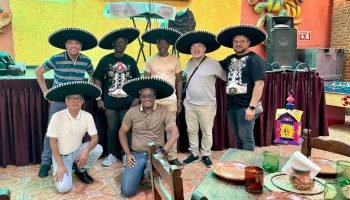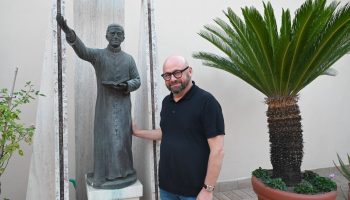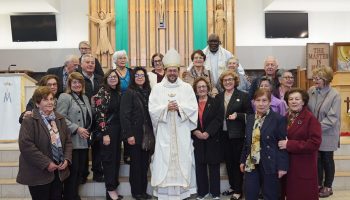
Gathered in the city of Lichinga, in northern Mozambique, the Consolata Missionaries of the Mozambique-Angola Region are holding their Regional Assembly to celebrate the centenary of the evangelizing presence of the Institute in Mozambican lands (1925–2025).
By Justus Pius Adeka and Dani Romero *
“Prophetic Presence: In Light of One Hundred Years, Remembering Our History in Mozambique and the Challenges of Today’s Mission” is the central theme of the event.

On June 13 and 14, the program included moments of ongoing formation, led by the Archbishop of Nampula and President of the Episcopal Conference of Mozambique (CEM), Mons. Inácio Saure, IMC. The bishop shared his joy at participating in the gathering, saying: “During these days, I enjoy the gift of being with the family.” He added: “This moment should be an opportunity to share lived experiences. Let us keep the family dialogue open.”
During the formation sessions, four main sub-themes were addressed, pointing the way forward:
One Hundred Years of Mission and a Simple Life in a Complex World
The journey of the first six missionaries who arrived in Mozambique in 1925 and settled at the San Pedro Claver de Miruro Mission, in the current Diocese of Tete, was remembered. In 1926, they expanded their presence to Niassa, founding in 1928 the Mission of Our Lady of Consolata in Massangulo. Starting in 1938, the following missions were established: Mepanhira, Mitúcue (1939), Maúa (1940), Lichinga (1945), Maiaca (1947), Cóbue (1950), Nsinje (1960), Metangula (1962), Cuamba (1962), Etatara (1962), Marrupa (1965), Majune (1965), Mecanhelas (1966), Mitande (1966), Nipepe (1967), and more recently, in 2002, Entre-Lagos and Metarica.
In 1946, the Consolata missionaries entered south of the Save River, in the current Diocese of Inhambane, and founded the missions of Massinga (1946), Nova Mambone (1946), Mapinhane (1947), and Maimelane (1948). In the 1960s, they established the missions of Muvamba (1960), Vilanculos (1966), and Funhalouro (1967), and in 1973, the Mission and Catechetical Center of Guiúa.

In the Archdiocese of Maputo, they began their work in 1948, taking over pastoral care of the Liqueleva Mission. They later founded the parishes of Matola (1951), Machava (1956), Boane (1963), Infulene (1972), and took over the parishes of Liberdade (1982) and Martyrs of Uganda (2010). In the 1990s, they opened the Philosophical Seminary in Matola and the Novitiate in Laulane.

In the Archdiocese of Nampula, the missionaries began working in 1983 at the inter-diocesan seminary of Nampula, and in 1992 opened the Consolata Minor Seminary. They later took charge of the parishes of Santa Maria and Nossa Senhora da Paz. In 2011, they returned to Tete, and in 2014 took on the parish of Our Lady Consolata in Fingoè, and in 2020, the parish of the Sacred Heart of Jesus in Uncanha.
Over the years, the Consolata missionaries have left most of these missions. The seed was sown and bore fruit in evangelization. Mons. Inácio warned: “Without history, we are illiterate in the present. Understanding the past is the only way to live the present with passion and realistically plan for the future.”
The Challenge of the Difficult “We” in the Mission
Inspired by Mons. Pedro Casaldáliga, the value of community life was highlighted in light of three major challenges: the difficult “I,” the difficult “other,” and the demanding “we” of communion. In a region marked by diverse cultures and nationalities, the importance of missionary fraternity was emphasized as a witness to the Gospel: “By this everyone will know that you are my disciples, if you love one another” (John 13:35).
Holiness Does Not Rhyme with Worldliness and Mediocrity
Holiness was presented as the concrete goal of missionary life. “First saints, then missionaries,” said Founder St. Joseph Allamano. A call was made for vocation authenticity and to overcome the temptations of corruption and self-indulgence—real challenges in contexts such as Mozambique and Angola.

A Simple Life in a Complex World
Simplicity is an essential element of a prophetic presence. In times of excess and complexity, being a sign of consolation requires simplicity and evangelical consistency.
In addition to the formation sessions, the Assembly was marked by strong moments of spirituality, such as the celebration of the Eucharist, the Novena to the Virgin Consolata – Patroness of the Institute – in preparation for her feast on June 20, and moments of fraternal fellowship and group work.

On Sunday, the Solemnity of the Most Holy Trinity, the missionaries visited various communities in Lichinga, where they contributed to pastoral animation and celebrations. The Assembly resumed on Monday, June 16, with the sharing of reports from the mission zones and an assessment of the various realities in Mozambique and Angola. On June 19, the new Regional Council for the 2025–2028 triennium will be elected.
In this centenary phase, the Assembly reaffirmed the commitment of the Consolata Missionaries to the ad gentes mission and to a creative fidelity to the charism inherited from St. Joseph Allamano, responding to today’s challenges with hope, communion, and prophetic presence.
* Fr. Justus Pius Adeka, IMC, and Fr. Dani Romero, IMC, Communications Team



